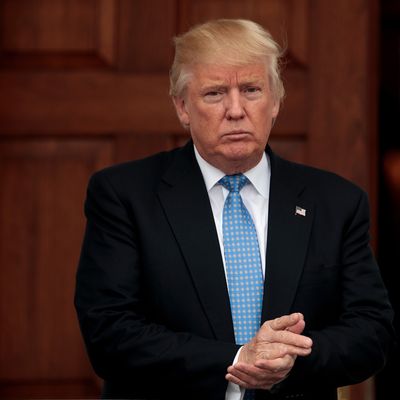
Donald Trump plays to the room. In his campaign’s early days, the president-elect used his rallies like a stand-up uses an open mic, testing out material to see what would kill. (Of course, in Trump’s case, the “material” consisted of policy proposals, many of which would actually get people killed).
Trump has occasionally admitted that he crowdsources his political positions, defending the legitimacy of the “birther” issue, on the grounds that people responded enthusiastically whenever he broached the subject, and confessing that he didn’t like the phrase “drain the swamp” until he said it at a rally and “the place went crazy.”
This presents a challenge for anyone who wishes to anticipate Trump’s future behavior: It isn’t clear whether he radicalized the GOP base, or the GOP base radicalized him. Trump was once a moderate Democrat; at other times, the kind of radical who proposes massive tax increases on the wealthy, the legalization of all narcotics, and single-payer health care.
Now that the campaign is over, what room will the president-elect most want to please?
On Tuesday, Trump offered incautious optimists cause for comfort. In a sit-down interview with the New York Times, the president-elect waxed moderate on the subjects of climate change, President Obama, military torture, and press freedom.
And yet, even as he played the reasonable Republican, Trump repeatedly deployed the reasoning of an authoritarian kleptocrat.
This was most apparent in Trump’s observation that he has immunity from federal conflict-of-interest laws.
Legally speaking, Trump is correct (although he could arguably be prosecuted on the basis of the Constitution’s Emoluments Clause). Literally, though, he very much isn’t. Which is to say: Conflicts of interest exist, whether or not one is legally bound to avoid them.
And Trump’s globe-spanning business presents him with myriad opportunities to subordinate the public interest to his personal one. In fact, he came very close to admitting that he had done just that in the very same interview — telling the Times that he “may have” encouraged British political Nigel Farage to oppose wind farms that mar the view from his Scottish golf courses, as reports had claimed.
After that meeting, Trump publicly requested that Britain name Farage its ambassador to the United States, an unprecedented move that outraged Thersea May’s government.
But for Trump, none of this matters because it isn’t illegal. Expending diplomatic capital on protecting the views at the Trump International Golf Links is good policy, because it’s good for his company and he can’t be punished for it. So, where’s the conflict?
A similar reasoning prevails in Trump’s reflections on libel law. During the campaign, Trump expressed his interest in making it easier to sue publications for inaccurate coverage of public figures. But since then, the president-elect has changed his mind — not because he realized that legislation would infringe on the First Amendment, but because he realized that such changes would increase his own legal liability.
Here, Trump suggests that his definition of a good policy is one that harms his enemies, but not himself.
Finally, while rationalizing his sudden disinterest in prosecuting Hillary Clinton, Trump said, “I want to move forward … I don’t want to move back. I don’t want to hurt the Clintons, I really don’t.”
On the plus side, the president-elect backed away from his campaign promise to prosecute his political enemy for a crime that federal law enforcement says she did not commit.
On the down side, his reason for changing his mind was not that he realized the gross illegality of his previous proposal, but rather, that he does not wish to “hurt” the Clintons (anymore).
In other words, the president-elect suggested that, when evaluating whether to push for a criminal investigation of an individual, he weighs his personal desire to inflict harm on them before his mind turns to trivial matters like “probable cause.”
As Trump moves from room to room and decade to decade, his political views shift radically. But through it all, he has consistently displayed an affinity for authoritarianism and exploiting public trust for personal profit. If you want to know how he will govern, best to keep those core commitments in mind.






























